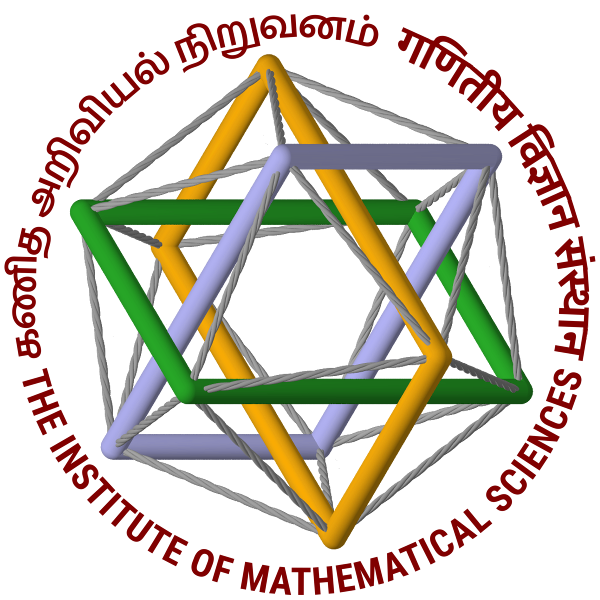Please click here for more information on early direct call for interviews in 2025
Graduate programme in Theoretical Computer Science
The normal route to the IMSc graduate research program is through an interview, and JEST (Joint Entrance Screening Test) is one of the means by which we screen students and select them for interview. The graduate program consists of two streams: the PhD and the Integrated PhD programme for Theoretical Computer Science in IMSc.
What is JEST?
The Joint Entrance Screening Test in Theoretical Computer Science is a test conducted across the country each year, usually on a Sunday in the month of February. However, in 2021 it was held in April and 2022 in March.
What is the eligibility for appearing for JEST?
Anyone with a Bachelor's degree in CS or related disciplines, or an M.Sc./ M.E./ M.Tech./M.C.A. in CS or related disciplines, interested in the mathematical aspects of computer science is eligible to appear for JEST. Students in the final year of these courses are also eligible to appear for JEST. Examples of related disciplines are mathematics, statistics, information technology, etc.
What are the eligibility criteria for admission to Ph.D. and Integrated Ph.D. programme?
Students with a Master's degree (such as, M.Sc./M.E./M.Tech.) in CS or related disciplines are usually admitted to the PhD program. However, using background information, performance in the admission process, and other relevant information, the student may be advised to credit more courses (the courses can be at the Integrated Ph.D. level). The student should also meet the admission requirements for the PhD program given by HBNI.
Students having a B.Sc./B.E./B.Tech./M.C.A. in CS or related disciplines are admitted to the Integrated Ph.D. program. This means that they pick up a Masters' degree after two years in the graduate school, and a PhD degree on completion of the graduate school. The student should also meet the admission requirements for the Integrated PhD program given by HBNI.
Where can I write the JEST exam?
Please see the list of centers.
Can I do a PhD part-time with my job?
No, we only admit full-time students at IMSc. However, if you register for PhD with some university, there are possibilities of research collaboration with IMSc. Please see our page on the Graduate Visitor Programme.
Can I use a GATE score instead of writing JEST in Theoretical Computer Science?
No. We use the GATE score as additional information.
Are past JEST question papers for TCS available?
See the Downloads section on https://www.jest.org.in/
Are sample JEST questions for TCS available?
See the Downloads section on https://www.jest.org.in/.
What material is covered by the JEST questions for TCS?
See the Downloads section on https://www.jest.org.in/.
What is the structure of the JEST examination for TCS?
It is a three-hour written test. The question paper consists of two parts:
- Part A is multiple-choice to be marked on the answer card provided. The answer card is collected by the invigilator at the end of 75 minutes of the exam. There are 25 questions of 3 marks each. Each correct answer carries 3 marks, each incorrect answer carries -1 mark. Unattempted questions fetch 0 marks.
- Part B requires short answers to be written on the space provided in the paper. There are around 9 questions, some are 8 marks and some are 12 marks.
How is the evaluation done?
- Part A is evaluated automatically. Part A scores will be available at the JEST website. IMSc decides a first cutoff. Only for students who meet this first cutoff, Part B of the answer-book will be evaluated.
- The Part B scores are not declared. IMSc decides a second cutoff based on the performance in both parts.
- Students meeting this second cutoff are called for an interview to Chennai.
- Interview dates are usually during the last week of April or the first week of May, if the exam is organized in February.
What should I do to increase my chances of getting selected?
Here are some criteria which were followed by the TCS JEST examiners in recent years.
The first cutoff selects the top students among the Part A scores. IMSc chooses the cutoff depending on the number of students taking the examination and the number of answer-books for which Part B is to be evaluated (manually). For example, in 2020 we chose the cutoff score to get the top 196 students in Part A.
- Among the top students with Part A scores, those who get low Part B scores are rejected.
- The top few among the Part B scores are selected. IMSc chooses this second cutoff depending on the number of students to be called to the interviews (to be done in a limited amount of time).
- Apart from this, we look at answers of candidates who top-score on individual questions in Part B (if very few candidates overall do well on a question they have an advantage), or if the answers are ingenious or meticulous enough to deserve extra credit. In 2020 we were able to call around 25 students for TCS interviews.
